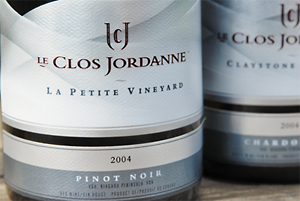 Le Clos Jordanne has been selling wine for only three years, but it is frequently hailed by both critics and wine lovers as the leading light in Canadian wineries. This acclaim is not solely a result of remarkable quality; Le Clos Jordanne also attracts so much attention because of what it represents. The vintners at Le Clos are at the forefront of the next generation of winemakers that are importing French (and specifically Burgundian) techniques into the Niagara Peninsula. A ringing success for Le Clos Jordanne could open a new chapter for our wine industry – a chapter in which our wine is ranked beside the fabled bottles of France – and this is why so many critics rave about it with revolutionary glee.
Le Clos Jordanne has been selling wine for only three years, but it is frequently hailed by both critics and wine lovers as the leading light in Canadian wineries. This acclaim is not solely a result of remarkable quality; Le Clos Jordanne also attracts so much attention because of what it represents. The vintners at Le Clos are at the forefront of the next generation of winemakers that are importing French (and specifically Burgundian) techniques into the Niagara Peninsula. A ringing success for Le Clos Jordanne could open a new chapter for our wine industry – a chapter in which our wine is ranked beside the fabled bottles of France – and this is why so many critics rave about it with revolutionary glee.
What does Burgundy offer Ontario? First of all, the cool climates of the two places are very similar. Over centuries of trial and error, the Burgundian wineries have learned what grapes excel in this weather. So, the first thing Burgundy teaches us is to stop screwing around with heat loving grapes like Cabernet Sauvignon or Merlot, and specialize on what we can do best. That’s why Le Clos follows the Burgundian tradition and grows only two grape varieties: Pinot Noir and Chardonnay.
More importantly, Burgundy is famous for its obsession with “terroir”. Terroir is the French term for the personality that a specific plot of land gives to its grapes. Terroir is a magic combination of the land’s soil composition, microclimate, and topography. The best bottles of Burgundy are precise reflections of the terroir of tiny, select vineyards (sometimes called “clos”). There is no mixing of grapes from different locations or any other technique that would dilute the pure taste of the land. Le Clos Jordanne has adopted this approach; they offer wines from distinct vineyards, each with its own unique voice.
Above all, Le Clos Jordanne embodies the Burgundian ethic of elegance and restraint. This philosophy is noble, but winemaking is an expensive business, and it also helps if you’ve got oodles of money. Le Clos scores in this regard – it is owned by Vincor, the largest conglomerates of wineries in Canada (Vincor also own Jackson Triggs and Inniskillin). The financial support of Vincor means that when you buy a bottle of Le Clos, you are getting it at well below cost. Vincor is supporting Le Clos not because it is a money tree, but because it is an opportunity to raise the profile of Ontario wine domestically and internationally. Vincor is underwriting the wine revolution.
With these thoughts in mind, I was excited last week to get a preview of Le Clos Jordanne’s soon-to-be-released 2006 vintage. Join me in my next column for a rating of the wines.
Matthew Sullivan is a civil litigator in Toronto. He writes a weekly blog entry here on lawandstyle.ca. The Short Cellar column appears in the print edition of Precedent. Matthew can be reached at matthew@lawandstyle.beta-site.ca

